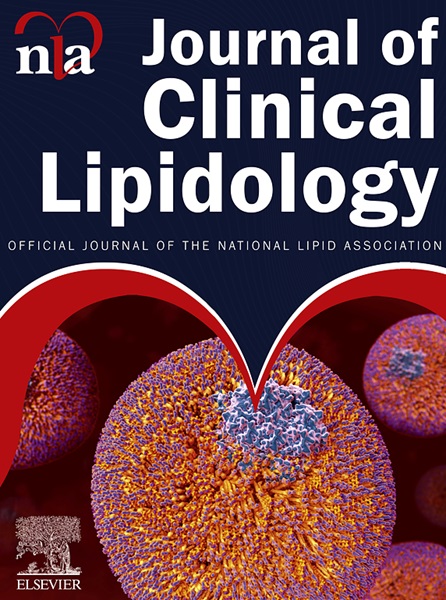非裔美国人中携带APOL1风险变异的当前吸烟者冠心病患病率增加
IF 4.6
3区 医学
Q2 PHARMACOLOGY & PHARMACY
引用次数: 0
摘要
背景:载脂蛋白L1 (APOL1) G1和G2基因变异在非裔美国人中非常普遍(在其他种族群体中很少见),与肾脏疾病、败血症和潜在冠心病(CHD)的风险增加有关。它们在与烟草相关的冠心病中的作用尚不清楚。目的:探讨APOL1风险变异在非裔美国成年人吸烟与冠心病流行之间的关系。方法:我们通过加利福尼亚大学旧金山脂质诊所招募了519名非裔美国成年人,进行了一项横断面研究。使用多变量logistic回归,我们在所有参与者和APOL1基因型亚组中评估了吸烟与冠心病之间的关系,总体上及其最严重亚型心肌梗死(MI)。结果:参与者中,41%的人(14%)或前(27%)烟民,54%携带APOL1风险变异(1或2等位基因),和28%的冠心病,包括16% MI。吸烟者APOL1风险变异有冠心病的几率比不吸烟者高3.3倍(95%置信区间CI: 1.6, 6.8), 2最强的效果观察那些风险等位基因(优势比[或]:7.3,CI: 1.1, 48.6)和大幅影响运营商的单个风险等位基因(or: 3.2, CI: 1.5, 7.2)。在非携带者中,目前吸烟与冠心病无显著相关性(OR: 1.3)。心肌梗死也有类似的趋势。既往吸烟与冠心病相关(OR: 2.0),与APOL1基因型无关。结论:APOL1 G1和/或G2危险变异的非裔美国吸烟者可能有更大的冠心病风险;这种关系似乎遵循一个加性模型。本文章由计算机程序翻译,如有差异,请以英文原文为准。
Increased prevalence of coronary heart disease among current smokers carrying APOL1 risk variants within the African American population
BACKGROUND
The apolipoprotein L1 (APOL1) G1 and G2 gene variants, highly prevalent among the African American population (rare in other racial groups), are linked to increased risk of kidney disease, sepsis, and potentially coronary heart disease (CHD). Their role in tobacco-related CHD remains unclear.
OBJECTIVE
To investigate the effect of APOL1 risk variants on the association between tobacco smoking and prevalent CHD in African American adults.
METHODS
We conducted a cross-sectional study involving 519 African American adults recruited through the University of California San Francisco Lipid Clinic. Using multivariable logistic regression, we assessed the association between tobacco smoking and CHD, overall and with its most severe subtype, myocardial infarction (MI), among all participants and APOL1 genotype subgroups.
RESULTS
Among participants, 41% were current (14%) or former (27%) smokers, 54% carried APOL1 risk variants (1 or 2 alleles), and 28% had CHD, including 16% having MI. Current smokers with APOL1 risk variants had 3.3 times higher odds of CHD compared to nonsmokers (95% CI: 1.6, 6.8), with the strongest effect observed in those with 2 risk alleles (odds ratio [OR]: 7.3, CI: 1.1, 48.6) and a substantial effect in carriers of a single risk allele (OR: 3.2, CI: 1.5, 7.2). Among non-carriers, current smoking was not significantly associated with CHD (OR: 1.3). A similar trend was observed for MI. Former smoking was associated with CHD (OR: 2.0), independent of APOL1 genotype.
CONCLUSION
African American smokers with APOL1 G1 and/or G2 risk variants may be at greater risk of CHD; this relationship appears to follow an additive model.
求助全文
通过发布文献求助,成功后即可免费获取论文全文。
去求助
来源期刊
CiteScore
7.00
自引率
6.80%
发文量
209
审稿时长
49 days
期刊介绍:
Because the scope of clinical lipidology is broad, the topics addressed by the Journal are equally diverse. Typical articles explore lipidology as it is practiced in the treatment setting, recent developments in pharmacological research, reports of treatment and trials, case studies, the impact of lifestyle modification, and similar academic material of interest to the practitioner.
Sections of Journal of clinical lipidology will address pioneering studies and the clinicians who conduct them, case studies, ethical standards and conduct, professional guidance such as ATP and NCEP, editorial commentary, letters from readers, National Lipid Association (NLA) news and upcoming event information, as well as abstracts from the NLA annual scientific sessions and the scientific forums held by its chapters, when appropriate.

 求助内容:
求助内容: 应助结果提醒方式:
应助结果提醒方式:


